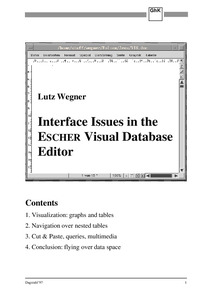| dcterms.abstract | Presentation at the 1997 Dagstuhl Seminar "Evaluation of Multimedia Information Retrieval", Norbert Fuhr, Keith van Rijsbergen, Alan F. Smeaton (eds.), Dagstuhl Seminar Report 175, 14.04. - 18.04.97 (9716). - Abstract: This presentation will introduce ESCHER, a database editor which supports visualization in non-standard applications in engineering, science, tourism and the entertainment industry. It was originally based on the extended nested relational data model and is currently extended to include object-relational properties like inheritance, object types, integrity constraints and methods. It serves as a research platform into areas such as multimedia and visual information systems, QBE-like queries, computer-supported concurrent work (CSCW) and novel storage techniques.
In its role as a Visual Information System, a database editor must support browsing and navigation. ESCHER provides this access to data by means of so called fingers. They generalize the cursor paradigm in graphical and text editors. On the graphical display, a finger is reflected by a colored area which corresponds to the object a finger is currently pointing at. In a table more than one finger may point to objects, one of which is the active finger and is used for navigating through the table. The talk will mostly concentrate on giving examples for this type of navigation and will discuss some of the architectural needs for fast object traversal and display.
ESCHER is available as public domain software from our ftp site in Kassel. The portable C source can be easily compiled for any machine running UNIX and OSF/Motif, in particular our working environments IBM RS/6000 and Intel-based LINUX systems. A porting to Tcl/Tk is under way. | eng |

